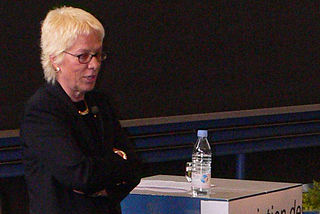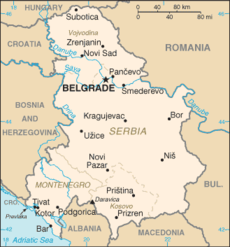
The International Criminal Tribunal for the former Yugoslavia (ICTY) was a body of the United Nations that was established to prosecute the war crimes that had been committed during the Yugoslav Wars and to try their perpetrators. The tribunal was an ad hoc court located in The Hague, Netherlands.

Since the breakup of the Socialist Federal Republic of Yugoslavia in the early 1990s, the foreign policy of the newly established Federal Republic of Yugoslavia was characterized primarily by a desire to secure its political and geopolitical position and the solidarity with ethnic Serbs in other former Yugoslav republics through a strong nationalist campaign. While the country was involved in Yugoslav Wars and therefore exposed to several rounds of devastating sanctions against Yugoslavia this involvement was often denied for political or ideological reasons. In the initial period Federal Republic of Yugoslavia unsuccessfully aspired to gain international recognition as the sole legal successor state to SFR Yugoslavia, the country which was one of the most prominent foreign policy subjects during the Cold War.

International criminal law (ICL) is a body of public international law designed to prohibit certain categories of conduct commonly viewed as serious atrocities and to make perpetrators of such conduct criminally accountable for their perpetration. The core crimes under international law are genocide, war crimes, crimes against humanity, and the crime of aggression.

United Nations Security Council resolution 1244, adopted on 10 June 1999, after recalling resolutions 1160 (1998), 1199 (1998), 1203 (1998) and 1239 (1999), authorised an international civil and military presence in the Federal Republic of Yugoslavia and established the United Nations Interim Administration Mission in Kosovo (UNMIK). It followed an agreement by Yugoslav President Slobodan Milošević to terms proposed by President of Finland Martti Ahtisaari and former Prime Minister of Russia Viktor Chernomyrdin on 8 June, involving withdrawal of all Yugoslav state forces from Kosovo.

United Nations Security Council resolution 827, adopted unanimously on 25 May 1993, after reaffirming Resolution 713 (1991) and all subsequent resolutions on the topic of the former Yugoslavia, approved report S/25704 of Secretary-General Boutros Boutros-Ghali, with the Statute of the International Tribunal as an annex, establishing the International Criminal Tribunal for the former Yugoslavia (ICTY).

United Nations Security Council Resolution 1915, adopted unanimously on March 18, 2010, after recalling resolutions 827 (1993), 1581 (2005), 1597 (2005), 1613 (2005), 1629 (2005), 1660 (2006), 1668 (2006), 1800 (2008), 1837 (2008), 1849 (2008), 1877 (2009) and 1900 (2009), the Council, acting under Chapter VII of the United Nations Charter, allowed a temporary increase in judges at the International Criminal Tribunal for the former Yugoslavia (ICTY) to serve beyond the expiry of their term of office to enable them to complete work on cases in which they were involved.

United Nations Security Council resolution 1034, adopted unanimously on 21 December 1995, after recalling previous resolutions including Resolution 1019 (1995), the Council discussed violations of international humanitarian law in the former Yugoslavia, specifically in Bosnia and Herzegovina.

United Nations Security Council resolution 1166, adopted unanimously on 13 May 1998, after recalling Resolution 827 (1993), the council established a third trial chamber at the International Criminal Tribunal for the former Yugoslavia (ICTY).

United Nations Security Council resolution 1191 was adopted unanimously on 27 August 1998. In it, after recalling resolutions 808 (1993), 827 (1993) and 1166 (1998), the Council forwarded a list of nine nominations for judges at the International Criminal Tribunal for the former Yugoslavia (ICTY) to the General Assembly for consideration.

United Nations Security Council resolution 1199, adopted on 23 September 1998, after recalling Resolution 1160 (1998), the Council demanded that the Albanian and Yugoslav parties in Kosovo end hostilities and observe a ceasefire.

United Nations Security Council resolution 1203, adopted on 24 October 1998, after recalling resolutions 1160 (1998) and 1199 (1998) on Kosovo, the Council demanded that the Federal Republic of Yugoslavia comply with previous Security Council resolutions and co-operate with the NATO and Organization for Security and Co-operation in Europe (OSCE) verification missions in Kosovo.

United Nations Security Council Resolution 1931, adopted unanimously on June 29, 2010, after recalling resolutions 827 (1993), 1581 (2005), 1597 (2005), 1613 (2005), 1629 (2005), 1660 (2006), 1668 (2006), 1800 (2008), 1837 (2008), 1849 (2008), 1877 (2009), 1900 (2009) and 1915 (2010), the Council noted that the 2010 target for the completion of trials at the International Criminal Tribunal for the former Yugoslavia (ICTY) could not be met, and therefore extended the terms of 23 judges at the ICTY.

United Nations Security Council resolution 1411, adopted unanimously on 17 May 2002, after recalling resolutions 827 (1993), 955 (1994), 1165 (1998), 1166 (1998) and 1329 (2000), the Council amended the statutes of the International Criminal Tribunals for Rwanda (ICTR) and the former Yugoslavia (ICTY) to address the issue of judges holding dual nationalities.
United Nations Security Council resolution 1431, adopted unanimously on 14 August 2002, after recalling resolutions 827 (1993), 955 (1994), 1165 (1998), 1166 (1998), 1329 (2000) and 1411 (2002), the council established a pool of temporary judges at the International Criminal Tribunal for Rwanda (ICTR) in order for it to complete its work as soon as possible.

United Nations Security Council resolution 1481, adopted unanimously on 19 May 2003, after recalling resolutions 827 (1993), 1166 (1998), 1329 (2000), 1411 (2002) and 1431 (2002), the Council amended the statute of the International Criminal Tribunal for the former Yugoslavia (ICTY) to allow temporary judges to adjudicate in pre-trial proceedings in other cases before their appointment to a trial.

United Nations Security Council resolution 1503, adopted unanimously on 28 August 2003, after recalling resolutions 827 (1993), 955 (1994), 978 (1995), 1165 (1998), 1166 (1998), 1329 (2000), 1411 (2002), 1431 (2002) and 1481 (2003), the Council decided to split the prosecutorial duties of the International Criminal Tribunal for the former Yugoslavia (ICTY) and the International Criminal Tribunal for Rwanda (ICTR) which had previously been under the responsibility of one official, Carla Del Ponte, since 1999.

United Nations Security Council resolution 1534, adopted unanimously on 26 March 2004, after recalling resolutions 827 (1993), 955 (1994), 978 (1995), 1165 (1998), 1166 (1998), 1329 (2000), 1411 (2002), 1431 (2002) and 1481 (2003), the Council called on the International Criminal Tribunal for the former Yugoslavia (ICTY) and the International Criminal Tribunal for Rwanda (ICTR) to complete all trial activities by the end of 2008.

United Nations Security Council Resolution 1966, adopted on December 22, 2010, after recalling resolutions 827 (1993) and 955 (1994), the Council established a residual mechanism to conclude the remaining tasks of the International Criminal Tribunals for Rwanda (ICTR) and former Yugoslavia (ICTY). It was the final Security Council resolution adopted in 2010.

United Nations Security Council resolution 1597, adopted unanimously on 20 April 2005, after recalling resolutions 827 (1993), 1166 (1998), 1329 (2003), 1411 (2002), 1431 (2002), 1481 (2003), 1503 (2003) and 1534 (2004), the Council amended the statute of the International Criminal Tribunal for the former Yugoslavia (ICTY) in order to allow temporary judges to be re-elected.

United Nations Security Council Resolution 1993, adopted unanimously on June 29, 2011, after recalling resolutions 827 (1993), 1503 (2003) and 1534 (2003), the Council extended the terms of office of 17 permanent and temporary judges at the International Criminal Tribunal for the former Yugoslavia (ICTY).
















